A multiple Barrymore Award winner, Liz Filios has twice been recognized as Best Actress in a Musical for her lead roles in Midsummer [a play with songs] at Inis Nua Theatre Company in 2014–the same year she received the F. Otto Haas Award for an Emerging Philadelphia Theatre Artist–and for Passion at the Arden Theatre Company in 2015.
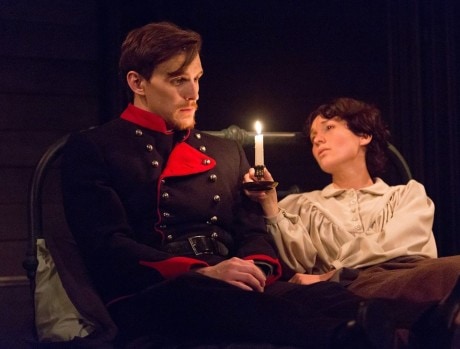
In addition to her acting skills, the Michigan native is an accomplished singer and musician who plays a range of instruments, from cello to accordion.
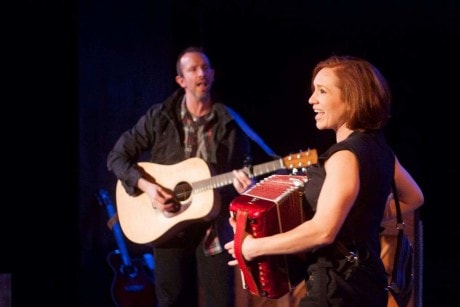
This month, Filios takes on a new challenge in the role of Rosalind for Lantern Theater Company’s production of As You Like It. Prior to a long day of rehearsal, Filios sat down to talk about her upcoming appearance, her background, and her approach to performing her first Shakespeare play on a professional stage.
Deb: How did you come to be cast in As You Like It? Did you answer an open audition call, or did Director Charles McMahon approach you about it?
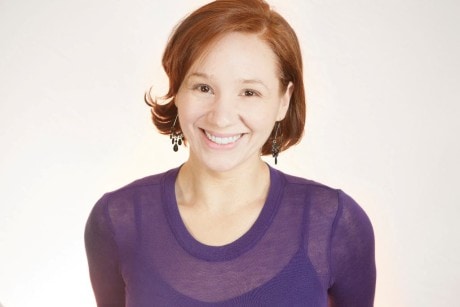
Liz: I had auditioned previously at the Lantern, so I was on file and they called me in to audition.
What made you decide to take on the show, having never done Shakespeare before?
It’s inaccurate to say that I’ve never done Shakespeare before, because I fell in love with his work in middle school and would sit in my basement and read it out loud! Then a teacher offered a Shakespeare class in my junior year of high school, and every day we would write out a whole Shakespeare sonnet by hand, so that by the end of the year we had done most of them, and I continued after the school-year ended till I finished all of them. There was something amazing about the process of feeling his words move through my hand; it was my first true appreciation of his writing.
In college, at the University of Michigan in Ann Arbor, I wanted to take more classes on Shakespeare, but there weren’t any open to Musical Theater majors, so I wrote a letter of appeal to be allowed to take a course outside of my specialization, and I was accepted! It was taught by Philip Kerr, and you could tell by his voice that he was a great Shakespearean actor. I loved to listen to him talk, I just couldn’t get enough. In that class he gave each of the students the opportunity to choose a role to perform, and I chose Viola from Twelfth Night. I’d go into the carillon on campus at night and I would practice my lines in the tower as the bells were ringing, so I could be as loud as I wanted and not disturb anyone. It was great to feel the vibration of the bells and the words.
My first professional gig out of school was an opera, Il Racconto d’Inverno—The Winter’s Tale—singing Shakespeare in Italian; that’s how I ended up in Philadelphia. I was in my senior year and looking for opportunities online, when I saw a chamber opera that was going to be co-produced in Philadelphia and Italy by International Opera Theater. I thought that was something I’d really love to do, so I called the company’s Artistic Director Karen Saillant to audition, but it was past the deadline; it was a Wednesday, and the auditions were already scheduled for that Friday. But I let her know that I sincerely wanted to do this, so she asked where I was, and I told her I was in Michigan, and she asked how I planned to be there in two days, so I said I would fly out to Philly, and she said, “That’s so crazy we’ll let you do it!”
At the audition I sang an aria, and Karen noted it was in the wrong key, that I should be singing in my high range. I knew so little about opera at that point, but she had the music in the right key in her car, so she went out and got it, and let me do it again, and the adrenaline kicked in and I did it; high notes were popping out of me that I didn’t even know I had! Then her son Bernard Bygott had me read a monologue for Perdita. He went around the reading table and collected everyone’s pencils, put them all together and handed them to me as if they were a bunch of flowers, and had me hand them out to everyone during my monologue. For me it was still a relatively novel idea of talking to the audience, of relating directly to them. I love when Shakespearean actors do this.
I was fortunate to observe some real masters at work in this respect when I performed in Aaron Posner and Teller’s production of The Tempest last year. I wasn’t an actor in the play, but I was a musician, so I got to be onstage for the entire show and watch it from above every night. Their Tempest was unique in many ways: it featured incredible magic from Teller, Christopher Rose, and Johnny Thompson, movement by Matt Kent from Pilobolus Dance Company, and Rough Magic, a live four-person band that played music by Tom Waits and Kathleen Brennan. I joined the production in 2014, when they suddenly found themselves short one singing accordion player. There aren’t a ton of us out there, and so when Aaron posted online that they were looking for someone to fill the job, the Philly theatre community rallied around me and helped me book it.
I did the play first at South Coast Rep in California, and then again this past fall at Chicago Shakespeare Theater, where I got to co-music direct as well. I learned so much just being in those rooms and listening to those actors. Creating a live soundscape to support their work was a wonderful education in itself. So even though this Lantern production of As You Like It is my first professional mainstage appearance acting in a play by Shakespeare, I’ve had many significant experiences with Shakespeare that were important to my development.
At this point in the rehearsal process, can you tell us how this show has been different from your previous work?
I did a lot more prep beforehand; more than for any other show I’ve done. I studied Rosalind when I attended Canada’s National Voice Intensive, headed by David Smukler in Vancouver, which I heard about through Reuben Mitchell. The way it came about was that Reuben and I did a primitive voice workshop together in 2012, and we would have these discussions about vocal technique and pedagogy after class. Reuben was always quoting David and he had planned to teach a course based on David’s instruction, on impulse and alignment–essentially on learning how to breathe. After Reuben’s passing, I didn’t know what to do . . . he was so dear to me and I was devastated by his loss. For a long time, I just wanted the world to stop. Then one day I got an email from Jay Berkowitz that I was nominated for the Haas Award for an emerging theater artist. For the application I needed to write an essay about my plans for the future and I really had no plans at that point. It was then that I Googled “David, voice, Vancouver” because I didn’t remember his last name, but he was so important to Reuben that I wanted to pursue studying with him. I downloaded the application and stared at it for months, not knowing what to write.
But I kept thinking about it and talking about it, and I realized that if I did make any plans for the future, I wanted him to be a part of them; I wanted him to be in my future, and not just my past. So I finally wrote the two essays–one for the Voice Intensive and the other for the Haas Award, and I talked about the young man I felt so connected to, and how going to Vancouver, studying voice, coming back to Philadelphia, and sharing what I learned was the best way I could think of to honor him.
I spent five weeks at the Voice Intensive just remembering how to breathe, how to be present, and how to feel, and that’s where I discovered Rosalind. Her journey really resonated with me. She’s hit with devastating news, forced to cope in ways she never could have imagined, and somehow she ends up thriving in a way that she wouldn’t have if her life had gone according to plan. I found a lot of joy and meaning in that character, and a year later I had an opportunity to audition for As You Like It at the Lantern. Getting the part was a dream, the culmination of a big cycle in my life, and a reason to be grateful. I also have to acknowledge the support of Reuben’s mother and Carol Haas Gravagno, to whom I dedicated my performance in the show’s program. They’re two strong women who gave me the impetus to do this.
Have you faced any special challenges in terms of the Elizabethan language?
I really love working on it, and the part of my mind that loves music and puzzles loves Shakespeare. This particular play is part verse and part prose, so there’s a lot to sink my teeth into here. I also play Ganymede, so I have color-coded my script in various degrees of pink, blue, and purple to help me understand the gender play in the story. The different meters are also really fascinating; you can see the evolution of Orlando’s love for Rosalind played out in the text. He becomes more sophisticated and much wiser through love over the course of the play; there are mathematical clues throughout the text. It’s challenging because there are some missing feet, but as with music, the rests are as important as the lines for cracking the code.
Personally I’ve never had this much text before, and Rosalind is so nimble with words, that I have to be aware of not being dyslexic, trying not to flip the letters or syllables, because I have such deep respect for the language. I want to do every sound justice.
Does this production adhere strictly to Shakespeare’s original setting in terms of time and place, or has it been reset?
It’s in many times and many places; it’s everywhere. There are hints of Elizabethan Shakespeare, hints of the Victorian period, and hints of contemporary music and life, so it’s a nice cross-section, a nice sandwich-cut profile, with many beautifully stacked layers of ingredients.
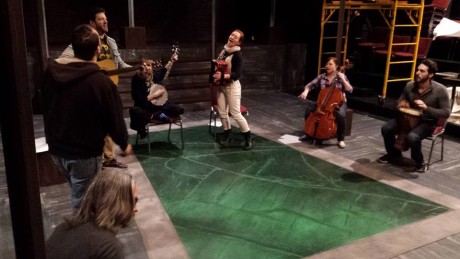
Has it been helpful for you as a veteran of musical theater that Charles is including a significant musical component in the Lantern’s production?
It has been useful in terms of connecting my body to the text, though I don’t do much of the singing in the show, so I’m not using it for Shakespeare’s words. But music in general makes the text feel more accessible, I think. It certainly unlocks something for me.
In addition to a bit of singing, are you playing any instruments?
I am! I’m playing the cello as Rosalind. Celia, portrayed by Ruby Wolf, plays the violin, and we have a duet in the first scene that establishes the differences between the characters. My music is sad and contemplative, while hers is upbeat, so that the battle of emotions in the music leads into the battle of wits in the language. But the actors in this meta-production step in and out of character to provide more musical segments, in addition to the songs Shakespeare included in his text. I’m also playing the accordion, and maybe one of two other instruments; I’ll see how it develops. As a director, Charles is open to the cast’s suggestions, and not just with the music. For some of my scenes, the blocking is different every time I do it and he allows me the freedom to do that, to try new things, so I continually search for more. He trusts the actors implicitly and he really values our input. He also throws out a lot of suggestions, and I love that; I love to explore and to have that kind of open interaction.
What special qualities do you hope to bring to Rosalind, and are you able to relate to her in any specific way?
She’s so smart and so good at improv, at thinking on her feet! I love that she finds the right words to express herself, and always just in the nick of time. I love the freedom, confidence, and self-worth that she’s able to find when she doffs her feminine persona and takes on a masculine one. There’s so much to discover when you break out of traditional gender roles, especially in Shakespeare’s time. I remember at the Voice Intensive, Gary Logan, head of the Academy for Classical Acting in Washington, DC, taught us a game called “In the Manner of the Word,” in which one person would have to guess what word the rest of us were trying to convey through the way we used our bodies. The last two words we chose were “masculine” and “feminine” and the woman who was supposed to be guessing them couldn’t, but it was shocking what she did guess. For “masculine” she said “roughly,” “powerfully,” and “apathetically,” and for “feminine” she guessed “softly,” “politely,” “tenderly,” and “obediently.” None of us were intentionally trying to play into gender-based stereotypes, so it was very upsetting and it stayed with me.
Rosalind has that same experience—having to behave like a princess, having to live up to cultural expectations, doing what’s learned and what’s allowed. But then she is more able to be herself when she’s disguised as the boy Ganymede, who’s pretending to be a girl; and that’s who Orlando falls in love with, away from the strictures of the court.
Who else is in the cast and on the design team?
It’s a fabulous cast and I’ve loved working with everyone! Jake Blouch is Orlando; he’s a dear old friend and such a joy and a talent, we have so much fun together. Ruby Wolf is a newcomer to Philadelphia; she’s smart and funny and brings great talent and energy to Celia.
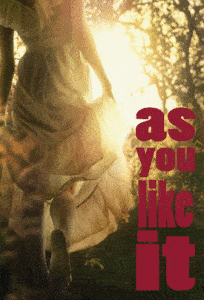
Meghan Winch is killing it as Phebe, Chris Anthony is hilarious and heartbreaking as Silvius, and Adam Altman is amazing in all of his many roles–his work is so clear and consistent, and his love of classical text is so infectious. And then of course there’s J Hernandez, who is just terrific; I feel so privileged to have the chance to share scenes with him. He probably doesn’t know it but I steal stuff from him all the time, and it always gets a laugh. They’re all a delight!
On the design team, Michael Hahn composed the original music, which gets stuck in my head for days. Janus Stefanowicz, the costume designer, is doing a great job of turning me from a girl into a boy, and it’s exciting for me to work with scenic designer Meghan Jones again, she’s created a very smart and effective set. Beckah Smith, the stage manager, is really good at setting the tone, making it enjoyable, and reining us all in, because we’re having so much fun!
Since you have enjoyed the experience, can we expect to see you doing more Shakespeare in the future?
Yes! I certainly hope so!
Thank you, Liz, for taking the time out of your busy day to talk about your highly anticipated performance!
As You Like It plays from March 10-April 17, 2016, at Lantern Theater Company, performing at St. Stephen’s Theater – 10th and Ludlow Streets, in Philadelphia, PA. For tickets, call the box office at (215) 829-0395, or purchase them online.
Listen to a podcast interview of F.Otto Haas Award Nominee (and Recipient) Liz Filios on REP Radio.






